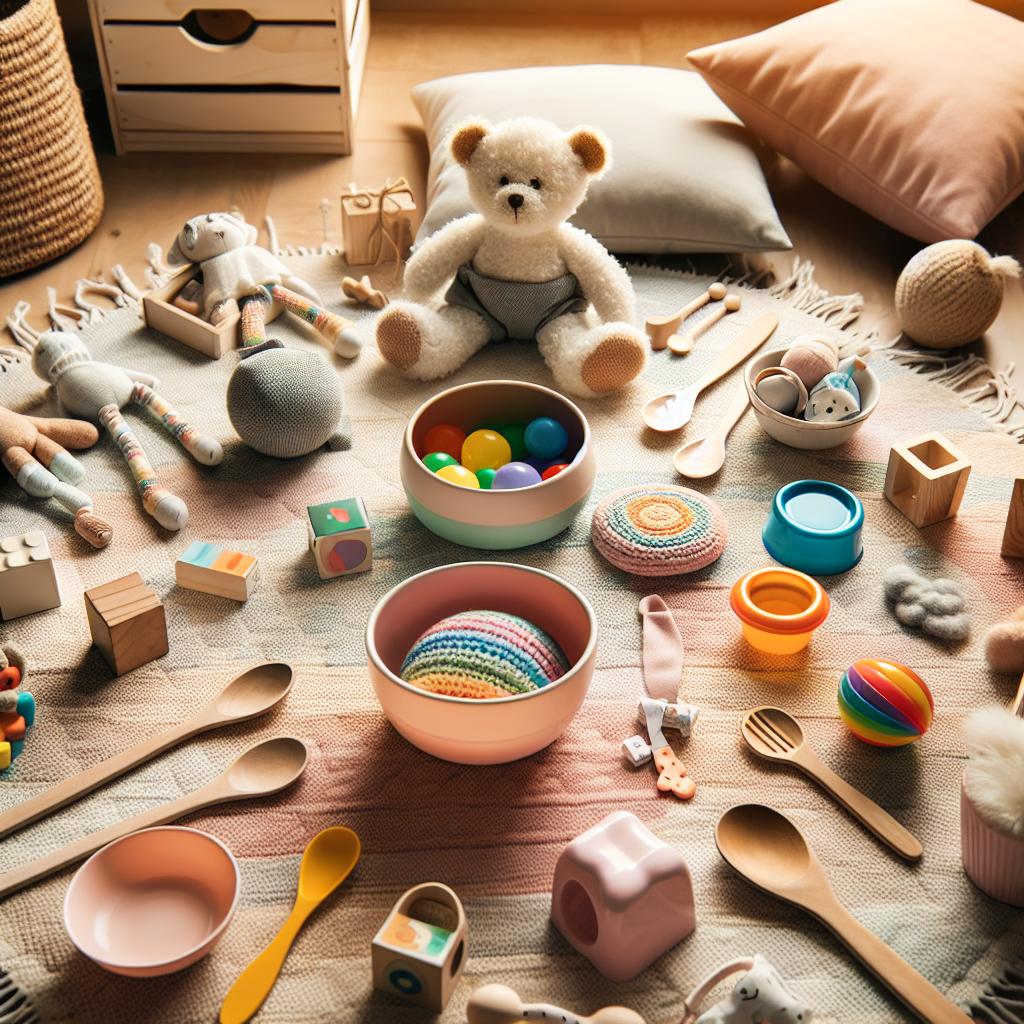Sensory Play – An Excellent Tool for Boosting Baby Development
Boosting baby development can be achieved with simple, fun and engaging activities that require nothing more than everyday items found around the house. One such method is sensory play, which is a rich resource for providing your little one with the stimulation they crave. In this post, we will discuss the benefits of sensory play and share some sensory play ideas that you can easily integrate into your baby’s routine.
The Importance of Sensory Play in Boosting Baby Development
So, what is sensory play, and why is it so beneficial for your baby’s development? Sensory play refers to activities that stimulate your baby’s senses (sight, touch, taste, hearing, and smell). By introducing different textures, colors, sounds, and tastes to your child, you are helping them explore and understand the world around them.
According to a Cleveland Clinic article, sensory activities can enhance brain function, improve motor skills, foster social interaction, and much more. Moreover, sensory play can be a fun bonding activity for you and your baby.
Easy and Fun Sensory Play Ideas Using Household Items
Here are some sensory play ideas that not only boost baby development but are also fun, engaging, and easy to set up using items you likely already have at home:
- Exploration Basket: Fill a basket with various items from around your house – wooden spoons, soft scarves, plastic containers, etc. Let your baby explore the different textures and shapes.
- Foam Bath: Bath time can be a sensory delight too! Add some baby-safe bubble bath to the water and let your baby indulge in the soft and foamy textures.
- Food Play: Let your baby squish ripe bananas, avocados or cooked spaghetti. They’ll love the feel of the food and might even sneak a taste!
- Music Fun: Fill containers with different items (rice, beans, small stones), secure the lids, and shake them to create a variety of sounds.
However, it’s essential to supervise your child during these activities to ensure safety – all while enjoying the dedication to boosting baby development.
Enhancing Sensory Activities for Optimal Baby Development
While sensory play activities can be fun and engaging, it’s essential to vary the experiences to cover all senses and foster comprehensive development. For example, while foam bath takes care of touch, food play can be a way to engage the senses of taste, smell, and touch simultaneously. A Made For Mums article suggests incorporating different textures, colors, and tastes to keep the play experience enriching and exciting.
Remember, even the most straightforward activity can be a sensory experience! The key is to stay creative, open-minded, and observant of your baby’s reactions to different stimuli. These little steps can go a long way in boosting baby development.
The Long-Term Benefits of Sensory Play
Engaging in regular sensory play doesn’t just provide immediate learning experiences for your baby. It also offers multiple long-term benefits. As discussed in this Sensory Surroundings blog post, sensory play can contribute to cognitive growth, enhanced memory, and improved social interactions. Therefore, incorporating sensory play ideas into your baby’s daily routine can lead to a journey of comprehensive development and growth.
Starting Sensory Play Early for Increased Benefits
When should you start sensory play with your baby? The earlier the better, according to Pathfinder Health. Sensory play can start as early as a few months old. Of course, the activities at this age will be simple, like exposing your baby to a few safe textures and sounds. But as your baby grows, you can introduce more complex sensory play that will challenge them and fuel their curiosity.
Discovering Your Baby’s Sensory Preferences
By introducing different types of sensory play to your baby, you can also discover their individual sensory preferences. Do they enjoy squishing soft things? Are they fascinated by bright colors? Or, do they find certain sounds entrancing? Knowing these preferences can help you create more targeted sensory play activities that will capture their interest more effectively, making play time even more enjoyable and rewarding.
Integrating Sensory Play into Daily Routines
Sensory play doesn’t have to be a special activity that needs a scheduled time. With a bit of creativity, you can easily incorporate sensory play into your baby’s daily routines. For instance, meal times can become an experience in touch, taste, and smell, while bath time can be transformed into a watery sensory adventure. Meanwhile, the outdoors can offer a wealth of sensory experiences, from the feel of grass underfoot, the sound of rustling leaves, to the sight of flitting butterflies. Buttonloop Therapies offers more practical suggestions on incorporating sensory play at home.
Enriching Baby Playtime with Sensory Activities
Enhancing baby playtime with sensory activities fosters learning and development in a fun and engaging way. Using everyday objects, you can create activities that stimulate all five senses. Oh Hey, Let’s Play shares numerous inspiring ideas for sensory activities at home that can spark your creativity.
Further Support and Ideas for Sensory Play
If you’re looking for a wealth of sensory play ideas, consider the Play Kits offered by Lovevery. These Play Kits provide a variety of sensory play tools and toys that are designed for specific developmental stages, making it easy to foster your baby’s overall development through play.
As exciting as it is beneficial, sensory play is an essential part of your baby’s development. It stimulates the senses, promotes exploration and discovery, improves cognitive and motor skills, helps with social interaction and provides lots of fun for both baby and parent. The more you engage in sensory play, the more you’re boosting your baby’s development and shaping their understanding of the world.
Don’t forget, sensory play doesn’t need expensive toys or extensive preparations. With a little creativity, you can turn everyday objects into sensory play items. Incorporate sensory play into your daily routine and see how it positively affects your baby’s development.
